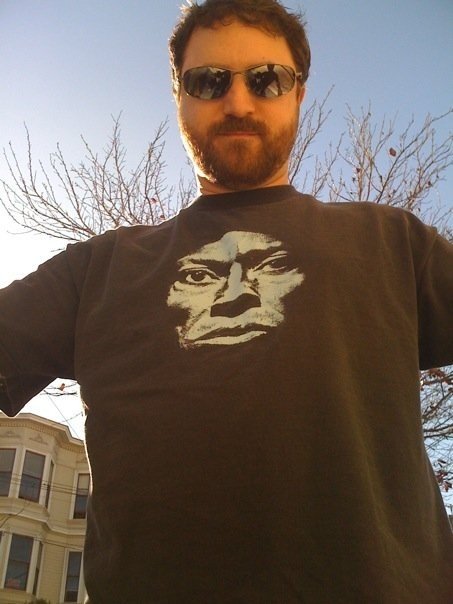 Today’s guest post comes to us from Cory Huff. Cory is an actor, entrepreneur and internet marketing coach currently living in Portland, OR. He believes the starving artist is a myth and is out to prove it with his website TheAbundantArtist.com where he teaches artists how to sell art online.
Today’s guest post comes to us from Cory Huff. Cory is an actor, entrepreneur and internet marketing coach currently living in Portland, OR. He believes the starving artist is a myth and is out to prove it with his website TheAbundantArtist.com where he teaches artists how to sell art online.
I “met” Cory after we both wrote articles about the myth of the starving artist (mine: here; Cory’s: here). I found him to be a kindred spirit and really admire his desire to help other artists succeed. Be sure to visit his great blog today!
Get A Business Plan or Get A Real Job
by Cory Huff
I talk to a lot of artists about how they make money. Most of them have a day job of some sort that supports their art habit. They all talk about how great it would be if they could get lucky and get signed, or they might have a vague idea that if they play a lot of local shows and maybe do a regional tour then they can make some serious cash off of doing concerts. Oh, and they also think they might be able to sell some CD’s online or maybe some T-shirts, but they’re not sure how many T-shirts they should order and they’re not sure if it’s worth it to sell them.
Here’s something they should have taught you in music school: You are in the music business. You might be in love with the idea of creating beautiful melodies or laying down slick beats, but the second you slap a price tag on a t-shirt or take some cash for a CD, the IRS considers you to be in business, and they are going to want a cut.
If the IRS thinks you’re in business, then you might as well admit that you need to think like someone who’s in business. Go on and pretend that you’re not, but when no one else is looking, you’d better put a plan together.
The essential elements of a business plan for artists
Creating a business plan can be as formal or as casual as you want it to be – you can even write it down on the back of a napkin. The idea is to create a concrete plan for what actions you need to take to get you to making the money you want.
You Unique Selling Proposition (USP)
What makes you unique from other artists? Are you a folk rocker who has a steel drum backing? Does your shock rock make Marilyn Manson look tame? What makes people stand up and notice you? Your USP might look like this:
“XYZ band shows that Fusion Jazz is fun for all people”
Simple, easy to understand, and it guides the rest of your plan.
Who likes your music?
Who are the fans that show up to all your shows, buy your CD’s, sport your t-shirts when no one else does, and bring their friends along? Conversely, who doesn’t like your stuff? Once you know these things, you can start identifying where your crowd is going to be so you know where to play, and where to sell your stuff.
Who is like you?
Identify 10 bands that are similar to your music. What are they doing? Are they doing well? Why or why not? If they are, how can you copy what they’re doing in a way that is uniquely you? If they’re not doing well, how do you avoid their mistakes?
What are your strengths?
Who is in your band, and what skills do they have outside of making music? Can someone do graphics, write copy, design websites? What do you guys need for promotion that you can’t do yourselves?
What are your money making opportunities?
Do you have an album? T-shirts? Other schwag? Do you play gigs? What makes the most money? How can you sell more of what makes money and automate the process?
A note about agents, labels, managers, and other such ilk
Do you need an agent? Probably not. There are tons of musicians out there who are making a living without agents. The internet is a huge opportunity for artists to sell their work without the middleman. These middlemen should be used as tools – if you know what you need, what you are doing well, and you are getting to the point where you are making money and growing and it will clearly help you make more money, then a manager might be a good idea.
Once you start writing down a plan, it will start to become crystal clear to you in which direction you should start moving. There are hundreds of resources online for writing a business plan, or if you need a little more direction, I’d be happy to help you.
The last thing I’ll say is this: There are so many opportunities for artists online. Besides iTunes and MySpace, there is a whole world of web marketing that most artists don’t take advantage of, simply because they don’t know about it. If you simply start doing and learning, you’ll find niches that are completely untapped in the online market that will allow you to get your music noticed.
Thanks Cory! That’s great, practical advice that we can all take to heart. Too many artists avoid the business side of things and then wonder why they aren’t achieving the kind of success they hope for.
I love hearing stories about how artists are being successful. If you have any success stories and/or questions about writing business plans, leave comments below.




YES!!!!! YAYYYYY!!!! Another artist with a strong belief in the business plan! It’s so important. Thank you for spreading the word!!!!!!!!!!!!!!!!!!!!!!!!!!
Thanks Michelle! Stop by and visit TheAbundantArtist.com and say hi!
Hey Cory, great stuff! I have for some reason been skirting around the task of clearly and distinctly (as Descartes would say) writing down my business plan, partly because I feel overly diversified in my musical activities, but this post, as well as the end of my day job approaching in December, has inspired me to sit down and do it. Thanks!
Thanks for putting this up! Great stuff!
Love the posts I’m finding on this site about how to be a working musician. I have been a wannabe for so many years, making a living as an entrepreneur in various business enterprises. I now sell real estate for a living (barely, in this market) and wonder why don’t I just tilt into the windmill and make a go of it. Looking for guidance and encouragement and finding some on your site, Jason.